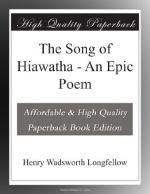|
This section contains 5,497 words (approx. 19 pages at 300 words per page) |

|
SOURCE: “A Jungian Interpretation of the Relationship of Culture: Hero and Trickster Figure within Chippewa Mythology,” in Studies in Religion Sciences, Vol. 11, No. 3, 1982, pp. 312-16.
In the following essay, Messer discusses Carl Jung's interpretation of Hiawatha as an example of the hero myth, and how his various deeds symbolize the struggle for freedom and independence from the unconscious.
Within North American Indian mythology a certain supernatural being is frequently presented as the synthesis of two apparently divergent traits of character. Here, the trickster-transformer-culture hero, or trickster fixer, as he is sometimes called,1 is at one and the same time a hero and a fool. The trickster-transformer-culture hero is both respected and ridiculed, admired and admonished, looked up to and yet looked down upon. This apparent contradiction in his personality, which appears so blatantly obvious to the student of native folklore and mythology, is taken as a matter of...
|
This section contains 5,497 words (approx. 19 pages at 300 words per page) |

|


